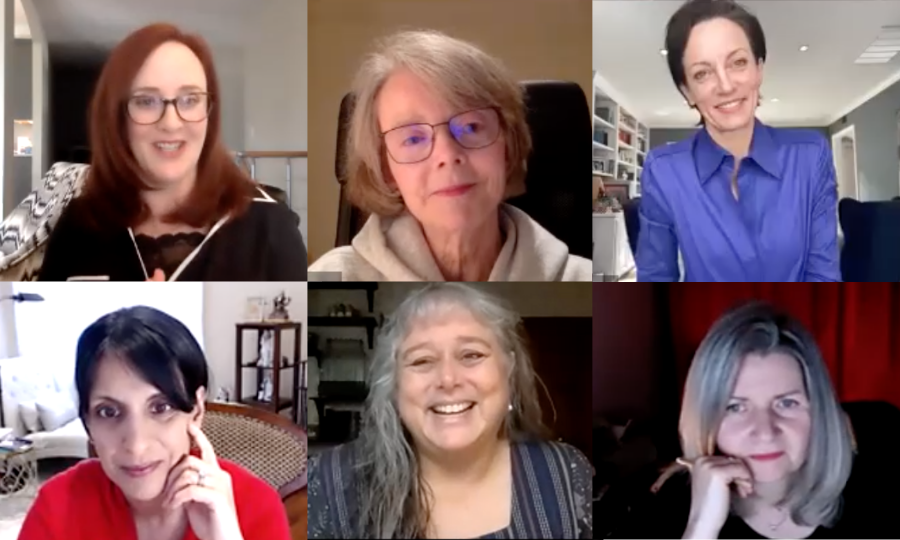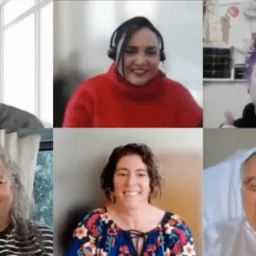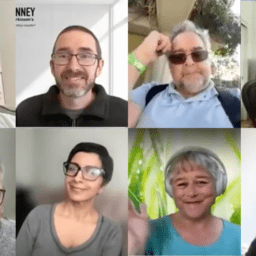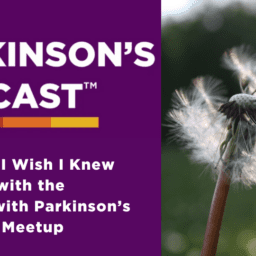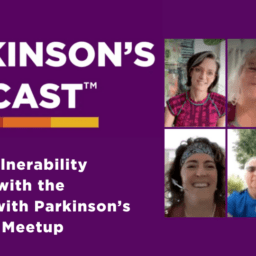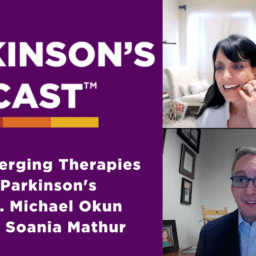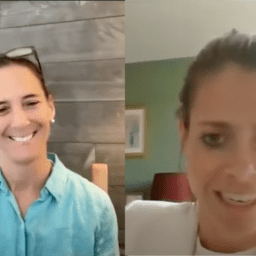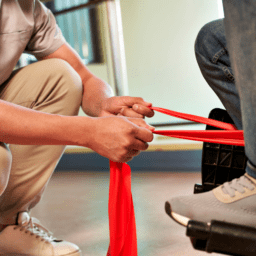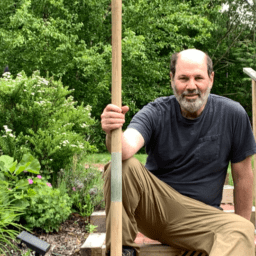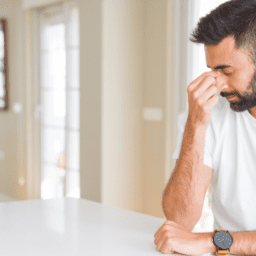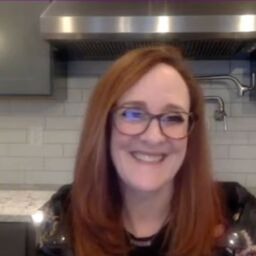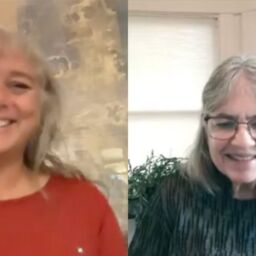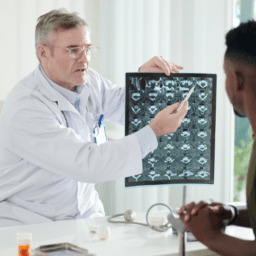Receiving a Parkinson’s diagnosis when you’re young is overwhelming enough. Being a woman with a Parkinson’s diagnosis adds an additional layer of complexities and challenges.
In this panel discussion, the first of our new YOPD Women series, our YOPD Women’s Council and special guest Kathleen Reardon discussed:
- The road to their Parkinson’s diagnosis
- The differences between men and women when it comes to symptoms and medications
- The importance of advocating for yourself and finding the right doctor
- Finding joy through new creative pursuits
You can watch the video below.
To download the audio, click here.
You can read the transcript below. To download the transcript, click here.
Note: This is not a flawless word-for-word transcript, but it is close.
Melani Dizon (Director of Education and Research, Davis Phinney Foundation):
Hello and welcome everybody to our first YOPD Women’s Council. We’re really excited to be doing this. Last year, we did a YOPD council, and it was so popular that we decided we’re going to do a YOPD Women’s Council. My name is Melani Dizon. I’m the director of education and research at The Davis Phinney Foundation. And I am here today with several standing members of the Council, and we have a special guest today, Kathleen Reardon. I’m going to go around and just give a quick hello to everybody on this Council. Then, as we dive into more of the content today, everyone will get a chance to talk a little bit about who they are and their story.
So, Karen, hello! Can you say hi to everybody here, Karen? And Dr. Soania Mathur, she’s one of our board of directors members, and she’s been a friend of the Foundation for a really long time. She’s helped with a lot of our webinars and she’s also one of the co-founders of PD Avengers. Kat Hill is one of our Davis Phinney Foundation ambassadors and she’s been a really big part of all of the work that we do. We’re so grateful for our ambassadors. Karen is also an ambassador and Kat is going to be moderating today.
Kat Hill (Davis Phinney Foundation Ambassador and YOPD Women’s Council Leader): Why hello! I apologize, everyone is calling in and saying hello to me at the same time, forgive me.
Melani Dizon:
Gaynor Edwards, she is the founder of Insight YOPD…
Gaynor Edwards (YOPD Women’s Council Leader): …Spotlight!
Melani Dizon:
Spotlight YOPD, I’m missing my mind. She’s in the UK and she’s calling in from there tonight. She misses her nights at the pubs so she’s just hanging out with us as much as she can. And then Heather Kennedy is calling in and she’s part of our YOPD council and now, also our Women’s Council. How are you doing Heather?
Heather Kennedy (YOPD Women’s Council Leader):
Pretty good.
Melani Dizon:
Great. So, I’m so glad to have all of you here. For those of you who wanted it, if you are interested in doing so, if you look on the bottom of your screen, you’ll see a little chat icon. If you click it, a little window will open up, to the right usually, and if you want to just say hello and say where you’re calling in from, we would love to hear from you. This is our first one this year, so we would love to see who’s joining us. “Hello from Toronto.” Hello, Missy. Thank you so much for joining us.
There’s a little thing at the bottom, it’s blue and it says panelists, probably. If you want to just talk to me and the other panelists, then keep it there. If you want everybody who’s on the call to see it, you can select all panelists and attendees and everybody will be able to see. “Hi from Orange County, California.” Hi Lauren.
We also have close captioning enabled. So, if you go to the bottom of your screen, you’ll see something that says live transcript. If you click the little arrow there’s an option for you to say enable. I think it says enable subtitles or enable closed captioning. And if you do that, then the whole series will be, you’ll be able to kind of read everything that we’re saying, and it’s amazing how fast they do it and how accurate it is in real time. And if you don’t want to see it, just disable it. So you don’t have to worry about that.
Anytime you want to type a question, go for it, I will be monitoring the whole time. If it makes sense for me to interrupt or stop something to ask a question, I will do so, otherwise I’ll hold them for a little bit later on, but definitely feel free to interact. We love hearing from people who are with us. I’m going to turn this over now to Kat and I’ll just be back here in the background.
And also, we have Leigh who’s in the background. She’s from The Davis Phinney Foundation and she is like the lightning-fast link provider. Anything that we talk about she will throw the link out there if we have a resource for it off the top of her head. Then also, we will record all of these sessions. We will provide you with the recording, a transcript, the audio, the show notes, and any links that we talk about. So, if you have to leave early, don’t worry. We’ll get that to you. Okay. Take it away, Kat.
Kat Hill:
Hi. Thanks Mel. I’ll try to not have any more phone calls during this, I put myself on airplane mode. So welcome. We’re really, really, really excited to be here today. This is really a first, in many ways, as young onset women who have Parkinson’s disease. We’re sort of the smallest of the small population in terms of how we’re represented in Parkinson’s disease, because there’s the fewest numbers of us. So, I feel really excited that we have a forum to talk about what’s unique to women. We debated a little bit whether this should be for all women or young onset women. We hope that all women will feel welcome joining us.
We’re going to focus on issues that are specific to women. And we all probably know we do better with women. We connect with women. When women are connecting with women, there’s actually something that happens physiologically. There are neuropeptides that are released that make us feel better. And we all probably intuitively know that and connect with women. But I just want to say that us, having an opportunity to do this here, is not only good for our information and our knowledge, but it’s actually really good for us.
So, I’m really excited to be here today. What I’m hoping is that each of us here on the panel will share a little bit about their diagnosis story and some of the symptoms that they experienced, especially at the beginning. And if any of those felt unique because they were female or things that maybe happened in their Parkinson’s journey that were unique to being female. So, I’d like to go last, who wants to kick us off? All right, Karen. Yeah.
Karen Frank (YOPD Women’s Council Leader):
Hi, everybody. Glad to be here. And Kathleen, it’s great to be here with you and all the other ladies. I was diagnosed at age 47 and for a period of several years before my diagnosis, I had a lot of symptoms, which I sort of wrote off to middle age or peri menopausal. It just never even occurred to me for several years to think possibly that I had Parkinson’s disease, even though my father, his mother and her sister had Parkinson’s. It was the last thing that I thought of. And my father was diagnosed actually at a young age as well. And I just, you know, wrote off sort of the sore muscles and the aching body and even a tremor, which I thought was a stressful job. I was a nurse anesthetist and I had a lot of stress at work. And I just wrote a lot of these things off to middle age. So, when I did get a diagnosis and was able to funnel my energy in a more positive, forward-moving direction and find other women to relate to, I felt more at home. So, I’m glad to be here.
Kat Hill:
Thanks Karen, who wants to go next? How about you, Heather?
Heather Kennedy:
I was just over on Clubhouse with a group of women who identify as 50 and over, and we were talking about life transitions and how we shifted from maybe a more competitive nature that we might’ve had when we were younger to a more inclusive, collaborative way of looking at life. And what I really enjoy about this group in particular is the collaborative becomes visionary. We are hoping to change the face of Parkinson’s by using our collective skills and everybody has something to bring to the table and we are lifting that and working with each other and seeing where we can drop in and share resources and inviting everyone in so that we can make these changes. So, this is just so exciting.
I know you asked about diagnosis, so I’ll be quick. Of course, I have the same story. It was all in my head. They tried every possible drug on the market because it was all in my head. And finally, I saw a doctor who looked at me and said, a hundred percent, you have Parkinson’s, but I’m going to run you through all the tests. First, I had lupus, they said, then I had fibromyalgia, they said, then I might’ve had, what is it?… The deer tick disease, Lyme disease. Then they just told me that I was crazy, which might also be true. But I think the important thing to is keep asking until you get answers because not having a diagnosis is really rough. And we do question our sanity enough because our dopamine is not really there. So, just keep asking until you get the answers.
Kat Hill:
That’s great advice, Heather. I like that. I like that a lot. And anybody feel free to chime in too. If we have questions. Gaynor, you want to chat? I can’t see everybody.
Gaynor Edwards (YOPD Women’s Council Leader):
Sorry, my mouse is always on the wrong side… Yeah, that whole thing with it being all in your head, I think that is a worry and I’m sure it takes women longer to get to that final diagnosis than it does for men. My mind was basically, it was like giving birth, I imagine, I imagine… I have a dog, but it took nine months. So, it was they went through all the processes, but the initial thing is always the GP (General Physician) and the neurologist both tested my reflexes. They’re too good, that won’t be Parkinson’s. And I don’t know whether they deliver it as badly, I guess whether you’re male or female, maybe I think there needs to be a bit more of a rule book sometimes with how you approach this stuff. And when it was actually the day of my diagnosis, I was shifted from an early morning appointment to an end of the day appointment. So, you know, at that point, you think, well, that doesn’t look good.
Kat Hill:
Yeah. Yeah. Interesting. So I’m hearing kind of a theme, Soania, how about you love?
Dr. Soania Mathur (Board of Directors member and YOPD Women’s Council Leader): I’m probably gonna break the mold because mine was pretty boring in terms of diagnosis. I was pregnant with my first child at the time and finishing a residency in family medicine and my right pinkie started twitching intermittently, and I, of course like anyone in the medical profession ignored it and said that it would go away, but it didn’t, it became more concerning. And then my husband said, (you know, he’s also a physician), he said, you’ve got to go get checked out. So, I went to a colleague of mine on a lunch break and he just walked me up and down the hall, did all the sort of clinical testing that they do and said, I think you have young onset Parkinson’s and it was very, very quick, very brief. Of course, I didn’t believe him and thought his clinical skills were a little bit laxed, but I got referred onto the movement disorder specialist and he sort of corroborated that diagnosis. So, I was 28 at the time when I was diagnosed.
Kat Hill:
Hmm. Interesting. I want to circle back, Sonia, after we all introduce ourselves and tell our stories about what it was like to be pregnant with Parkinson’s because that’s unique to women, at least so far. Let’s see, Kathleen, do you have anything to add or, or throw in here?
Kathleen Reardon (PhD, Professor Emerita, Writer, Artist, Person living with Parkinson’s):
Just the fact that the stories are, you know, they’re fairly common. I mean, even though Sonia, yours was different, I mean there was some delay even though you were around doctors and there’s an element of disbelief that women have to get past, and that doesn’t just happen with Parkinson’s. I was misdiagnosed with breast cancer for a year and a half when I was 30. And so, you know, after that, I was very careful about making sure that I was very assertive about my health, but it still took a while to get diagnosed with Parkinson’s.
Kat Hill:
And I think for those of us that are talking about the denial piece, that was definitely a part of my story. Even though my dad and several family members had Parkinson’s, they were all older when they were diagnosed, and they were all men. And so, I ignored symptoms for quite a good while. Like a good healthcare provider, as a nurse practitioner, it wasn’t even on my radar frankly. But in hindsight, I’m curious to hear from others too, in hindsight, are there things that were happening that now you think might be Parkinson’s?
I know for me, I struggled quite a while with anxiety and depression before I had sort of the twitch and the head bob, some of the more classic Parkinson’s symptoms. And I wonder sometimes, that was probably some of the onset of Parkinson’s and it is that all in your head piece. Are we missing some of that clinically, especially with women, I wonder? I’m going to open that up for discussion. Yeah. Karen, just jump in.
Karen Frank:
Yeah. I can relate to that tremendously. I think one of the earliest symptoms I have looking back, I can tell this now was acute onset of anxiety. You know, I had 20 years of experience doing anesthesia in a pretty aggressive academic medical center. I did big cases. I was very good at what I did. I’m experienced enough to function at a high level in that setting. And suddenly, I was finding myself overwhelmed during emergencies, reason, mentally and physically not able to respond in ways. And I really just thought, oh, I’m aging. This is too much for me. I need an easier job. I’m getting burnt out. And really, I was having acute anxiety as an early presenting symptom of Parkinson’s disease. And I remember thinking at the time, of maybe changing jobs, and going to an easier place to work. And it was sort of this general thing that I’ve found among nurses, which were primarily female and advanced practice nurses, who I was working with in the medical field, that as you age, you just sort of move on to greener pastures in medicine. When I finally presented with motor symptoms and got a diagnosis, it was sort of a confirmation that all of that was not in my head. You know, I really felt badly about myself because my performance was declining, and now I can be gentle and be kind to myself and say, wow, that was an early presenting symptom of a brain disorder.
Kat Hill:
Gaynor, I see your question. Kathleen, I’m curious if you can share with us some of what you’ve learned about this process and learned about women specifically and diagnosis, because, you know, you’re here sort of as our expert and I’d love to use you to dive in here. Thanks, Gaynor, for standing by.
Kathleen Reardon:
Well, I studied gender issues a lot in my career. I think the expertise I might have has been gotten firsthand because I wasn’t allowed to reach, you know about women. In fact, I wrote a couple of articles for the Michael J. Fox Foundation and that took a bit actually to say we really need to look at women because I was a woman saying it, you know? But we really did need to look more at women because most of the time people that you would see who had Parkinson’s, they were men. And if they were celebrities, they were usually men too. And it was very difficult to identify, because like a lot of you, I was probably around 48 or 49 when I was beginning to realize that something was off. I was beginning to think I had breast cancer again.
My husband and I had a wedding renewal because I had had breast cancer when we got married. And we said, you know, 15 years from now, we’re going to have a wedding renewal, no matter what. And so, we had a beautiful wedding renewal, but I remember not feeling quite right. You know, I looked great and maybe this happens to a lot of you because especially since you’re so young, you’re all lovely. And people will look at you, at your face, and say, well, you look great, you know, but that really doesn’t have a lot to do with Parkinson’s.
And I have a lot of women say that to me, and what do I say to that? You know, if I say, well, I’m not really great, it’s like I’m denying the validity of what they just said, and I don’t want to be complaining, but it’s kind of tells me to never talk to them about it again, because they just wanted to say something. They just wanted to say, I look awfully good, which makes you feel that once again, like some of you said you felt before the diagnosis, as if you were making this up or something, and that it is not real. I looked into that and women were experiencing that more often.
And I became very aware of my doctors too, and how they were managing it, once I finally found a doctor who thought I had Parkinson’s, and I’ve mentioned to my doctors that I don’t want, and you know, I don’t say it rudely, but I don’t really want the word “complaint” in my file. And, you know, my doctors will say, that’s what we were taught. We’re supposed to say the patient complained about this and the patient complained about that. And I said, well, you can do that with your male patients, but don’t do it with me, because there’s something about a woman complaining. So, say, Kathleen “explained” or she “described” or she “elaborated” or whatever it might be. And you know, the doctors I have took that to heart and they actually did make those changes and they talked to their fellows about it. And one of them introduced me to the men and had me talk to them about it because he said, this is a study that needs to be done. Because maybe we are treating our female patients differently. And perhaps even by using those words, we’re treating them different.
So, when I’m listening to you, I’m going back to being 48 or 49, and I didn’t get diagnosed until 52. So, there were a few years in there, just like many of you, where not having it identified seemed to me worse than having it identified. Once I knew I had Parkinson’s, I’m not saying that it was an exciting thing and like many of you, my mother had Parkinson’s, and yet once again, I didn’t think that’s what I had initially, because my symptoms were not balance related, but they were more cognition. And as a professor of business in preventive medicine, the students would ask me questions and normally I’d be ahead of them, and I found myself saying, can you ask that question again? It’s a little like what you were talking about, Karen, and that I was thinking, well, wait a minute, am I getting too old for teaching? And that was actually a sign. And then, because you figure out one sign, you begin to reflect on the others.
But my experience has been, you have to be your own advocate, especially as a woman. I know that because I have other health issues and every doctor I meet agrees. I remember saying to one of my doctors, I said you know, I read more research recently about how women are treated differently. And sometimes, and this is a heart doctor, sometimes they don’t get the kind of treatment that a man will get. And I said, what’s your response to that? And his response to that was, the research is accurate. And I said, well, geez, what are we gonna do about that? And he said, well, I’ve always treated you like a man anyway, Kathleen. Okay. But what about everybody else? But I knew what he meant. He has a great sense of humor. And he had the honesty to tell me that the research was accurate, and he said, I think you have to be very straightforward with us. You have to, you have to not let us tell you what we think it is or what’s going on. You have to be a partner with us. So, he’s obviously a very good doctor.
Kat Hill:
I love that. I love that. I think words do matter. Words do matter, no matter where you’re writing them. Gaynor, you had a question? Thank you so much love for waiting.
Gaynor Edwards:
You’re welcome, love. I think there’s something there, you know, we’re talking about how it gets discounted by the doctors that, you know, it’s all in your head, but I think a lot of women go there thinking this is stress. That seems to be the sort of default thing for a lot of people. I was certainly going through a stressful time. And I think now that I know more about it, I think that that was my trigger. But, at the time, I just thought it was all, you know, part of the stressful stuff I was going through. You know, why wouldn’t a frozen shoulder and insomnia and depression, why wouldn’t that all be stress? But I don’t know if blokes, sorry men, report as much stress as an initial thought, and whether they think that it’s stress-related when they first go to the doctor. Usually you hear the guys say, you know, they had a blow to the head, maybe that’s where they think their Parkinson’s came from, whereas women think it’s more sort of emotional trauma.
Kat Hill:
I think it’s interesting too, that with the exception of Soania, all of us were diagnosed, well, and Heather, you might drop out of that, but at that peri-menopause time. I think for me personally, it was easy to write off not sleeping well. I came at everything as a women’s health care provider in thinking that, oh, it must just be, you know, mid-life. I was forgetting things cognitively; I was having trouble as well. And I do think women tend to process more verbally, right? So, we often come in with maybe more verbose complaints or reports of or experiences of to the provider. So yeah, I’d be curious to hear Soania, a little bit of what it was like for you, partly as a physician and as a wife of as physician, and as a pregnant woman, about your process during pregnancy and then after delivery too. I’d be curious to hear if that shifted at all for you.
Dr. Soania Mathur:
Yeah. My oldest is now 22, so this is quite a while ago and I’ve had two more girls since then. They’re now 19 and 16, actually 20 and 16. And it was different for each of those pregnancies. My symptoms would be amplified because I couldn’t take the medications that I was going to take, because there was so little known about the possibility of injuring the fetus because of certain medications. So, I stuck to the very, very basics like taking beta blockers at certain times in the pregnancy and things like that.
The first one was just a normal delivery that no one was very excited about it. I ended up with a C-section. The second one, I went for genetic testing and counseling, and they sort of lit the match because no one really knew what to do with me. So then, you know, that delivery, I had five people in the room and then the next delivery I had, you know, just the regular care again. So, it was interesting because, you know, as a physician or when you’re in the medical business, you tend to rely on studies and research and evidence. And there really was no evidence, even in terms of medications, or very sparse evidence, on what I should be taking, what I shouldn’t be taking, is the delivery complicated one or not… So, it was very unnerving from that perspective, not knowing what to do.
Kat Hill:
Do you think it’s gotten better Soania? Do you think it’s gotten better over time? Do we
have more data?
Dr. Soania Mathur:
You know, I don’t think it’s where it should be 22 years later. I think there are a lot more young women that are going through the same thing that I went through and really don’t have much more knowledge. Maybe the genetic counseling might be more a part of pre-obstetrical referral care. But, you know, I haven’t come, and I could be wrong, somebody else might know better, but I haven’t come across any major studies that have looked into this aspect. And it’s an important one. It’s an important one for sure.
Kat Hill:
Heather, you have your hand up.
Heather Kennedy:
At first, I did that accidentally, but now that I’ve heard what Soania said, I do have something to add. Can you hear me okay? Okay. So, I’m so honored to be here with Kathleen too. I’ve been following Kathleen’s work forever, since I was first diagnosed, she was actually one of the first women that I found online. And by the way, has anyone ever told you, you resemble Jodie Foster? Wow. Just saying.
Kathleen Reardon:
No, but it used to be Susan Sarandon.
Heather Kennedy:
I’ll take either of those, right?
Kathleen Reardon:
I don’t know which side it is…
Heather Kennedy:
Both is good. Both are good! But I wanted to say, just to add, that nothing happens in a
vacuum. So, it’s kind of like when I was diagnosed with a food allergy, I have celiac disease, but before I got diagnosed, I tried every process of elimination. It’s like, try taking milk out of your diet when you’re a college student or grad student, like rushing, or you have babies, or try eliminating very specific things one at a time, like soy and then all kinds of different corn and good luck. So, I think the process of elimination with Parkinson’s is often difficult for neurologists who aren’t movement disorder specialists. And the first doctor I saw was definitely not equipped. So, Gaynor is the one who taught me a lot about the women’s issues, because she’s the first one that I ever knew to approach how the fluctuations in medication prior to our monthly cycles are different and those hormonal details. It really is a smorgasbord of sorts. Like we have all these other things going on simultaneously, and it’s really hard to distinguish what’s Parkinson’s and what’s not?
Gaynor Edwards:
How are you finding the menopause, Heather? Because, frankly, it’s a whole new circle of hell.
Heather Kennedy: I’m fine….
Kat Hill:
I call it shaking and baking. Kathleen, I’d be curious to know if you have advice for women about how to advocate. I love the things that you’ve chosen. So, certainly we can advocate that we’re not reported as “patient complains of,” but are there other tools that you think would be useful for women on this call and for us too, to glean from?
Kathleen Reardon:
I probably have quite a few of them. I might have a booklet that, well, it’s kind of a proposal, and I put it away because I started writing fiction, you know a couple of crime mysteries after many years of academic work. But in between I did write a… it’s almost a booklet now, about communication with Parkinson’s. And actually, I wish I had put it in front of me.
But we all differ, you know, in our styles of how we communicate. And also, we differ as we change, you know, over the years, you might start off, you might be direct, but you might start off more demure, and in one of the books I wrote called, “The Secret Handshake” about politics at work, some people are purists when they start out and they sort of think, well, if you just work hard, you’re going to get ahead. And I think I might’ve started off that way, but it didn’t last long.
Then, you know, other people are much more of street fighters and for a lot of women, for a lot of people, I think particularly women, it’s very difficult to become really assertive even about your healthcare. And even today, you know, we’re talking today, but like Soania was saying, in 22 years, there should have been a lot more research. In 22 years, there should have been a lot more information on women so that you should have had a hard time finding me. But there isn’t enough still.
And we do, I think, need to be particularly aware of our own styles. You know, what is your inclination with your doctor? And you know, I can provide you with the types and the styles that I’ve written about, and you can find yourself, and you can see if there are difficulties. What I’ve found, even though I know how to be assertive, and I know how to do it about my healthcare, at least post breast cancer, I still found that by the time I got to the doctor, and by the time I waited in the waiting room, and by the time I got to the doctor, and actually, in my case, I had to take a train to get to the doctor, I was so, so tired that the me that I would have liked to have had in front of the doctor was not there.
Then on top of that, the doctors, the doctor I started out with anyway, did not think I had Parkinson’s. And so therefore I would find myself coming back on the train, this was from Boston to Rhode Island, physically worn out, wondering if I was making it up, wondering if I just hadn’t explained myself very well, or whether this doctor just didn’t care, and all these things just created greater exhaustion.
And you know, as time went on, I became much, much better at working with my doctor, making sure I had the right doctor and speaking up. Even now, when I go in to see my neurologist in Ireland, I know the first words out of his mouth are going to be, are you exercising? Which by the way, I hope to get to that because that made a tremendous difference. The me you’re seeing now was not the me before I really got into Parkinson’s exercise. And he’ll ask me about whether I’m taking Sinemet. And so, I’ve learned with him, especially since he moves very rapidly, I say to him, I just want to assure you that I’m doing that, and I think you’re also going to be asking me about this, and I’m doing that, but what I want to talk about today is this and this. And so, I don’t allow the issues that I’ve already dealt with to become the issues during our precious 15 minutes or whatever I have. And without that, I find myself often listening to a doctor talk about things that I really have already managed, or at least for the large part. So, what I’m trying to say, I hope I’m getting to it, is that you really need to be ready to prevent the appointment from going off onto an issue that is relevant for a number of Parkinson’s patients, but is perhaps no longer relevant for you.
Kat Hill:
No, I think you nailed it. Yeah.
Kathleen Reardon:
That takes some confidence in your demeanor. I have one doc, my neurologist in Boston, he tells me, you know, you are Reardon, are the worst patient in the world. And I said, well, you know, I travel 3000 miles to come and see the worst doctor in the world. So therefore, you know, I guess it’s even. So, you know, the rapport allows me to be able to say what my thoughts are on something, and he, you know, he takes it very well. And I’ve been told that he’s not the kind of doctor that communicates very well. Well, that’s not true. He is, at least with me. And so, I’ve tried to find, how does my doctor communicate as well? Not just me, what’s my style? And are our styles similar to each other? Or are we butting up against each other? And if he or she is an exceptional doctor, and I want to hold on to that person, then I’ll have that discussion with them. I’ll just say, you know, my style is different, and I don’t want you to take it the wrong way, but you know, this is how I am nowadays anyway. And usually, that works very well.
And I think that rapport is so important. I’ve had so many Parkinson’s patients, men and women, tell me that the meeting with the doctor, the appointment gets out of hand and that they have this list that they made and they’re driving home or riding home, or taking a train or whatever, and they see that three quarters of it was never addressed. And what was addressed was not what they needed addressed. And also, I found that Parkinson’s made me, initially anyway, I don’t know if insecure is the right word, I just let things happen to me a little bit more than I probably should have. And now, I’ve discovered ways, and you know, my field is communication, so you’d think I would have been instantly good at it, but I think when you’re ill, a lot of things are difficult, very difficult and very confusing. So, you have to have people, you can really trust.
I have an article I wrote, and it’s not about Parkinson’s, it’s easily found on the internet and it’s called, “Did you really say that?” And it’s about how to handle situations where people say something unusual or it’s semi- insulting, and ways that you can respond. And I’ve done the same thing with Parkinson’s. I’ve learned ways that I can respond to difficult situations where people have said something, perhaps a doctor, perhaps not a doctor, perhaps just a person. You know, sometimes you talk to somebody about… You think they want you to talk about Parkinson’s, so, you start talking about Parkinson’s and you find out kind of quickly that they just want to tell you that that always happens to me too. I have that same thing. I lose my keys, and I also have trouble sleeping at night, and, oh yeah, I shake when I get really nervous about the things. You know at that point; you’re not really talking to a person who wants to hear you talk about Parkinson’s. I think I would incline toward being very choosy about who I talk to, I’m talking to all of you, but we all have it. But I would be inclined to be careful, because I don’t want to make myself miserable, you know. I don’t want somebody’s comment, and they may mean well, frankly, but it would just be something that I’m going to dwell on for an entire day. I don’t have that kind of space health wise, none of us do. So, you have to be careful. There are people out there who really do want to know what it’s like to have Parkinson’s, and those are the people you can talk to.
Kat Hill:
Well, thank you. That was wonderful. That’s very helpful, I think, for our listeners.
Kathleen Reardon:
You can also tell me if I’m getting off track and you want to hear me talk about something else.
Kat Hill:
I’m loving hearing you talk about it all. I think you’re right on track. Gaynor’s got her hand up and so to Soania, so go for it.
Gaynor Edwards:
I was just going to say, you make a very interesting point about the banter and the importance of banter. I think just generally when you’ve got something like this, any light, any joy that you can instill in a conversation, I think is, you know, it’s invaluable. When it gives you that little bit of whatever dopamine is in there, you know, mixes it up a little bit, gives it a bit of a joie de vivre. So, I think you’re bang on there. And if you can have that kind of rapport with anyone, but especially with the big boy neurologist or whatever, so that you know you’re on a level where… and humor is a fantastic level. We know that on this side of the pond.
Kat Hill:
We try to remember it here on this side of the pond.
Gaynor Edwards:
Oh, I know, I know, I’m only being a tinker. The other thing I was going to say, I wanted to know Kathleen, you started writing fiction post-diagnosis, so I’m just curious, were you already writing fiction?
Kathleen Reardon:
No, I wasn’t writing fiction and I wasn’t painting, and now if you asked me 15 years, 10 years ago, are you ever going to be an artist? I was thinking, oh please, I was a chemist, and I was a social scientist, I’m not going to be an artist. I love art, but I’m not going to be one. But now I paint. And I have read about Parkinson’s people who paint and how it’s so common, I mean, so many of us paint. And no one has the answer on that. I’ve read some things about, well, maybe it’s our medication, but I think that’s kind of unfair to people who are putting a lot of time into art. You know, oh yes, just because I pop a pill, that’s why I can, you know, almost be Rembrandt. I don’t think that’s what it is. I do think that what we do, I think it’s a natural inclination of the human brain. Especially if you give it a little bit of a nudge, the neuroplasticity of our brain allows us to forge new pathways if we choose to do so. I just decided I would start painting and I was fortunate enough to have a woman say, you know, there’s something there. I thought that was very sweet of her, but in time I’ve really been fortunate.
Now when it came to writing, I’ve always been a writer, but because of my having to be tenured and a full professor and all that business, you couldn’t go off and say, well, guess what, I’m also writing novels. That wouldn’t have gotten me anywhere. But yes, I think it was about, well maybe 15 years ago, maybe less, that I did the first draft of a novel. One of them is called “Shadow Campus,” and it’s about a woman, a young woman, a female professor, who was found hanging in her office the night before the tenure decision and she’s not dead, but her brother has to fly out and they’ve been estranged, but they have to uncover what’s going on. And the second one’s called “Damned if She Does,” and that came out last year, which isn’t a good year, 2020 during COVID. So, tell all your friends because the word certainly hasn’t gotten out about that.
But I don’t know Gaynor if there’s something in particular, but I’ll tell you that these… even though I still have that cognition problem and I only have maybe a couple of good hours a day, then I meditate, I am fortunate to have found Bernie Siegel’s meditation morning and evening meditation, I recommend it to everybody, and then I get more time. It has really given me like a gift to be able to do this writing. It hasn’t been easy, not like my younger years or my pre-Parkinson’s years. The painting comes to me easier than writing nowadays because of the cognitive demands of writing and editing and editing. But it’s really made a difference.
Gaynor Edwards:
Yeah. I mean, it is a common thing that we hear of this kind of creativity, whether it’s poetry or, you know, crafty stuff or painting or whatever. And I love the idea of you know, going, yeah, I’m a prolific painter and, you know, I just pop a dopamine agonist and paint the front of the house, but it doesn’t quite work that way, does it? Just get this done!
Kathleen Reardon:
Yeah, well that’s right. I can paint the front of the house even without my dopamine, but you know, it’d probably be a little squiggly. But it is something that we suppose we have the capacity for creativity, maybe all of us, I don’t know, but I think it’s definitely worth giving it a go because I certainly wasn’t painting landscapes. This is one of my older ones, but you know, sea scenes and I have all kinds of… And oh, hey, here’s the latest book “Damned if she does.” This is a woman who keeps sexual misconduct a secret for years and until she comes upon the body of the man who caused it all and becomes the prime suspect. I have to say, it’s very, very tough to do with Parkinson’s, but it gives me a good feeling to be able to accomplish it.
I bought a calligraphy set. I thought, I’d give that a go. I think we should all decide what it is that brings you joy. And don’t think you have to be good at it. I have a website by the way about painting called you know, www.paintingdoc.com and it’s for people with Parkinson’s.
Kat Hill:
Fabulous, I bet Leigh will put that right up for us.
Kathleen Reardon:
I’ve thought about maybe doing some things on writing. So that people might start writing, maybe memoirs, or, you know, I don’t know if my kids will ever read a memoir. If I do it, maybe they will. But it’ll be there then, if I do it write it someday.
Kat Hill:
Soania has something to add here.
Dr. Soania Mathur:
Well, I guess it could tie in with that feeling of joy that we all seem to get from our creative endeavors, but I just wanted to take it back to what you were saying about the appointment with your movement disorder specialist, or neurologist. I think that the list that you talked about is really key, because I think what happens, and I’ll admit it as a physician, that we tend to treat the disease, not necessarily the patient. So, you know, if I were to increase your Sinemet and get rid of your tremor, that might be a victory on my part that I was able to reduce your tremor, but is it really a victory for you? If the side effects are worse than the tremor was, or if I didn’t address your constipation or anxiety, which is what’s keeping you from enjoying life, and until we have a marker for Parkinson’s, I think that, you know, that communication with your physician about what your quality of life goals are, is really important because until there’s a cure, it’s all about quality of life and living well with this disease. So, I think that was a really good point you made.
The other point was about rapport. Rapport is paramount because this disease is all about communication. Like I said, we don’t have a biomarker. So, the physician depends on your recall of your symptoms and what you’re going through and how it’s affecting your quality of life in order to make management decisions. So, that report has to be there. If you don’t feel comfortable with your physician and communicating with them, that’s a problem and people should feel that, you know, it’s okay if you have to go to another physician for a second opinion, or you have to go somewhere else to feel more comfortable. Your comfort and your rapport with your physician, I think is really key. And people shouldn’t feel guilty about doing that.
Kathleen Reardon:
Absolutely. I mean, it doesn’t even have to be that you’re yucking it up together. You know, just the feeling that that person cares about you. And, I do think that the help you give, and you’ve just confirmed that Soania, it helps you and it helps the doctor, because the doctor doesn’t want you to go away thinking, well you know, he didn’t deal with what I care about, you know? And so yeah, I sort of shopped around for doctors, and the doctor that I told you about, the one I laugh with, I didn’t shop around for him. He’s one of the best because I have an autonomic condition, orthostatic hypotension, and he’s one of the best, and so I didn’t want to lose him. So, over time we developed the rapport. I wanted his expertise and I think I sorta knew that we could work it out. And now we do have a really great rapport.
And also, I learned this with breast cancer, I used to go in with my note cards, to my oncologist, and he said to me, and he wasn’t supposed to be a guy you could get along with either, but he was great eventually. And anyway, I would have my note cards and then one day he said to me, you know, those damn note cards, they drive me crazy. And I said to him, well, they’re not going anywhere. And he said, nah, you know, to be honest with you, I think you’re going to survive because you really want me to cover what is important to you. And so, I thought, you know, that’s pretty good. And I think he did sort of save my life, he and a couple of others, cause I had lost a year and a half. You know, I’m lucky to be talking to you today.
Kat Hill:
We’re lucky that you’re talking to us today. Karen, your hand’s up.
Karen Frank:
Yeah. I had a couple of things I wanted to bring up based on things that as a group we were talking about and to build upon what Soania was saying and going back to the doctor visit. As a woman, I just, I think I’ve been conditioned to believe that I don’t want to be annoying to the doctor. So, you know, I only got to see my movement disorder neurologist every year, year and a half, because he’s so backed up and I see a nurse practitioner in between, and maybe I have a neurologist that I see on the side, but I wanted to adjust my medication and I thought to myself, and this just happened the other day, why should I wait around for months? I mean, why not send an email on the portal and say, hey, I’d like to increase my medication. I tried it and it worked well.
And I thought about how long I hemmed and hawed about contacting him because I didn’t want to be a bother. And the truth is, since I increased my medication a couple of days ago, it’s the first time in three years since my diagnosis, that I’ve been on an adequate dose. And it’s not for failure of the doctor, but I almost was just brought to tears to feel what it felt like to be back into my body as a normal feeling, because I’ve been walking around under medicated for fear of bothering the doctor. And I think that’s just sort of this generalization about women and hysteria and mid-life and that kind of thing. That was one thing I wanted to talk about.
And the other issue about being a middle-aged woman and you know, a lot of us as we age and our Parkinson’s advances, we’ll have the complexity of multiple conditions to deal with. And I’ll bring up the lack of sleep as one example. I was getting up seven or eight times a night to urinate and I thought it was Parkinson’s related. So, I mentioned it to the urologist, and I mean, who can sleep well when every night you’re awakened at least once or twice an hour to urinate. So, he sent me to a urologist, the urologist didn’t think it was urologic. She thought it was not neurologic either because it would have been happening during the day as well. And she said, have you been tested for sleep apnea?
So, you know, I finally ended up with the pulmonologist and I’m an advocate for myself and once I was diagnosed with sleep apnea and got proper treatment, I have finally gotten a good night’s sleep, but it all started with a physician wanting to give me oxybutynin to stop peeing because I had overactive bladder. Well really, I was a middle- aged woman who had gained some weight approaching perimenopause, developed sleep apnea, and happened to have Parkinson’s and other things. So, it took a team of like four or five different doctors to put the story together. But I finally got a dental appliance for sleep apnea and I’m sleeping through the night. And finally, after three years of not wanting to be a bother to the physician to get an adequate dose, I feel great again. That was one thing I wanted to mention.
And on the tail end about the sort of concept of self-discovery and creativity, I started writing poetry, now that I’m not working, and you know, I didn’t anticipate retiring at 47, but I’ve discovered public speaking. I was terrified to do public speaking. I actually enjoy it now. And I’ve made a hobby of that, and I’m writing poetry. They’re not the best poems in the world, but I do enjoy it. And the other day I was upset about something and I thought, oh, maybe I’ll just write a poem. And I did, and it made my day better. Those were just some things I wanted to share with the group.
Kathleen Reardon:
I’d love to see some of that poetry sometime, you might email it…
Melani Dizon:
You will be able to, I’m talking from the background, because we’re doing a poetry cafe with all of our people with Parkinson’s that we do a class for. So, we’ll share the info with you.
Kat Hill:
Yay. Thanks Mel. Hey Heather, do you have something to add love? You’ve been rather quiet, other than purple shirt.
Heather Kennedy:
Well, this is a new shirt that I’m trying out that’s for handicapped people with a zip on the side. Yeah, I’ll tell you more about it when I get a chance, my hands aren’t working, they’re too tight, but the reason that I’m sort of going like this in the background when Karen says that she’s found speaking and that she’s doing poetry, you know, I met Karen at the cure Parkinson’s trust at the Van Andel Institute, with Gaynor, and Gaynor ended up covering for me when I couldn’t even leave the hotel room on time because of dystonia and this panic that sets in when your meds aren’t working, I was just so frozen that I just couldn’t get moving, I was hysterical. Then I started crying and you know everybody said, hey, if you’re going to get people who are going to understand it’s going to be this crowd. So, just relax. But what happened is Karen ended up sort of stepping in and covering this area that was really important, and what I find is that we all do that. We all sort of take turns, you know, picking each other up. We get knocked down; we pick each other up.
But what I wanted to say is about the artwork and about the poetry. It becomes less performative as we get older, the ego tends to take a back seat. We’re not worried about what other people think quite as much. We still care. We, we don’t G.A.F. if you will, but we’re not so concerned with putting everything out there in a way that has to be super polished, because we know we don’t have time.
And I want to reiterate what Kathleen said about finding her voice in different ways after diagnosis just for the sheer pleasure of exploring new things. That’s what keeps us excited, curious about life, and indeed joy is, as I mentioned, our birth right, joy and pleasure. So, this one more thing I wanted to add too, is that many of us are neurodiverse. So, we have this neurodivergence, it’s a new buzzword, where we might have the intersection of ADD or some learning disability that went undiagnosed and then Parkinson’s, so like I said, everything’s happening at once for many of us, but that creative piece, that is how we get through it. It’s huge. So, I encourage everyone who wants to try some creative hobby or some creative craft or whatever.
Kathleen Reardon:
Yeah, absolutely.
Kat Hill:
Yeah, and I think I’d like to echo too what Kathleen said, that, you know, our brain, we used to think our brain was more fixed, and what we find is that it’s not fixed. We can learn and develop new things and lay down new neural pathways. We can lay them down to find joy. We can lay them down to learn a new skill. And it’s actually very, very good for us and it’s good for our brain. And just like it’s been really great for my brain and my spirit to be here with all of you today. I always learn quite a lot from everybody on the panel. Does anybody have any other questions or remarks before we start to wrap up a bit? Cause I feel like we’ve covered things pretty well. Does anybody have anything else to add to their story?
Kathleen Reardon:
Well, first I just want to congratulate Karen on getting past worrying about the doctor, bothering the doctor. I mean, my experience with doctors is that they really appreciate, I mean, those note cards do another thing too, they really do the doctor a favor. We really cannot take two hours of somebody’s time. So, if you really know what it is that you need help with, then that saves time also for you, and you won’t go on and on. You’ll arrive prepared to talk about what it is that you want.
Kat Hill:
Doctors can’t read our minds either. If you’re having trouble with depression or urinary incontinence or sexual dysfunction or freezing or all of the things, if we’re not exhibiting that right in front of them, they don’t necessarily know to address it. And so we’ve got to be respectful of that piece too, that we have a right to advocate for ourselves, but also to not expect them to know what we’re thinking.
Dr. Soania Mathur:
Oh, I agree, Kat. I mean, they’re just getting sort of a snapshot clinical picture. They’re not seeing you in your social or home or occupational environment where you’re really getting tested and your symptoms can be very, very different in those areas. Your life experience is very different in general, compared to what they see in the office. So for sure, and they can’t know what your quality of life goals are, you know, for some, it may be just to walk down to the bottom of the driveway. For another person, it might be they want to go back to running marathons. So, unless you express to them, this is what I need in order to live and optimize my quality of life, they can’t know.
Gaynor Edwards:
And you’ve got to be honest, otherwise it’s a waste of time, isn’t it?
Kat Hill: Indeed, indeed.
Gaynor Edwards:
You know, oh, I couldn’t possibly mention my periods to my male doctor.
Kat Hill:
Well, those are especially who you need to be mentioning them to.
Gaynor Edwards:
Oh yes, sorry. Yes, you’re right.
Kat Hill:
It’s our job as advocates to teach them the best way to help better serve the needs of women. Well, what a privilege to be here with you all. Mel, do you have anything you’d like us to touch on or how did we do here?
Melani Dizon:
Oh yeah, you did great. And I’m so glad for the people that joined us. If you’re still with us, we have a really great lineup for this year. Next month, we’re going to talk about medications and treatments. And then after that, we’re going to talk about period menopause and hormones, contraception, and pregnancy. We have a whole list of things. So, definitely join us for that. We will be recording all of these sessions. So, we’ll send you the recordings, the audio, the transcripts. You can watch them at your own convenience for sure. And if you like this, tell your friends, get everybody here. It’s a really fun group of people. We’re excited to come to you this year. And Kathleen, thank you so, so much for being our special guest.
Kathleen Reardon:
I tell you, time flew by, I tell you. I’m delighted to be with you.
Kat Hill:
Yeah. Thank you for joining us, Kathleen.
Kathleen Reardon:
Thank you. Thank you for inviting me. I’d like to get on that list now, so I can follow along and see what’s going on and joining now and then.
Melani Dizon:
Absolutely. Well, thanks everybody for joining us. We’ll see you next month!
Show Notes
- It is important for women to be their own advocates when it comes to their medical care. Since appointments with your neurologist may be few and far between, arrive at your appointment with a list of items you wish to discuss with your doctor, along with a record of your symptoms. (Use our “Goal Summary for Doctor Visits” worksheet to help you determine your priorities for each appointment.) Being prepared and knowing what you hope to accomplish through the appointment will help you maximize your limited time with your doctor
- When early symptoms of Parkinson’s begin to appear, women may be more likely to write them off and think that “it’s all in their head.” Women, including YOPD Women panelists Kat Hill and Gaynor Edwards, often attribute symptoms such as stress, aching muscles, tremors, anxiety, depression, and insomnia to their monthly cycles, pre-menopause, menopause, or simply stress
- Women with Parkinson’s who are pregnant may need to avoid certain medications because of unknown risks, and therefore their Parkinson’s symptoms may be exacerbated
- Many women living with Parkinson’s credit creative outlets, such as drawing, poetry, painting, and dance, with helping them find or renew joy and meaning in their lives
- Currently, there is little research about women with Parkinson’s, and especially pregnant women with Parkinson’s. (You can learn more about Parkinson’s related research inequities in our recent webinar with Dr. Nabila Dahdwala, MD, and Dr. Jonathan Jackson, PhD)
- It can be frustrating for women living with Parkinson’s to hear from their non-Parkinson’s friends that they “look great,” when their symptoms may have little to do with their outward appearance. One way to work through this frustration is to kindly educate friends and family about what to say, and not to say, to someone with Parkinson’s
additional resources
5 Reasons to Join (or Start) a Women’s Only Parkinson’s Support Group
How the Arts Can Help You Live Well with Parkinson’s
[Video] How to Live Well with Parkinson’s Through Dance & Creative Expression with Amy Carlson
Join Us for our First-ever Poetry as Medicine Cafe
Kathleen Reardon, who joined the panel as a special guest, discussed her work as a writer and painter. She also explained how she has found considerable value in the practice of meditation. You can find links to her work and referenced practices below.
“Finding information about being a woman with Parkinson’s was challenging”
“Did You Really Say That?” A Repertoire of Responses Women Need Now
WANT more advice from our YOPD Women’s Council?
Find all recordings from our YOPD Women’s Council Series here.


